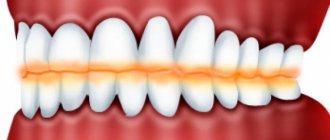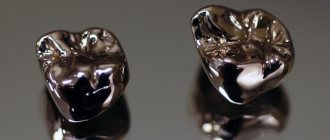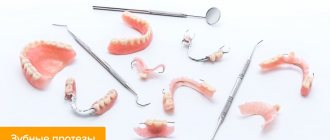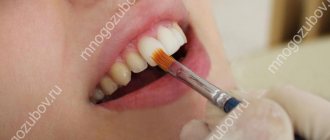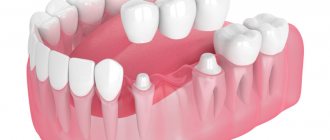When the need for dental prosthetics arises, the question arises - which crowns are best to install. Modern dentistry offers various options for dental crowns. They differ in material, purpose, and manufacturing technology. Each type has its pros and cons, each is recommended for certain indications.
Types of prostheses
Prostheses differ from each other in the materials that are included in their composition and the fixing elements. Modern dentistry divides removable dentures into:
- acrylic;
- nylon;
- clasp
Acrylic or plate dentures have been used in dentistry for a long time. They are voluminous and rigid, but at the same time light and unnoticeable. Due to the lack of teeth to which the orthopedic structure can be attached, a plate is made that is installed using suction or using special glue. This type is considered the most accessible and widespread.
The load when chewing falls on the gums and leads to their atrophy. To avoid this (to transfer the load to the bone and not harm the gums), it is better to use removable dentures on implants.
Nylon removable dentures are made from safer and more modern materials. They are more aesthetically pleasing than acrylic ones and more comfortable (they do not injure the gums, do not cause allergic reactions and do not absorb odors). Resistant to bacteria that cause inflammation.
Due to their softness, the systems also lead to bone tissue atrophy over time and cause pain when chewing solid food. Nylon dentures cannot be repaired. Their price is 2-3 times higher than acrylic.
Clasp dentures are reliable and durable, but they are not used for complete prosthetics. These are structures with a metal frame; several crowns are attached to an arch and attached to adjacent teeth using attachments or clasps.
Such a prosthesis provides an even load when chewing, does not cause discomfort, and does not cause complications on the gums. It is made from several types of materials (zirconium, acrylic, plastic, metal ceramics). When deformed, dentures can be repaired. This is the most expensive removable design.
What to pay attention to before prosthetics
To choose the most suitable denture, you need to consider the following parameters:
- Condition of the mucous membrane of the gums. Periodontitis is a contraindication to almost all types of prosthetics.
- Crown placement: reversal and crowding.
- Condition of the crowns. If the crown is destroyed and cannot be restored with composite materials, then it is reconstructed using an anatomical inlay.
- Stability of the root system.
- The condition of the tissues in the cervical region and the root part of the tooth.
- Size of the defective area.
- Location of the dental unit being restored. This is the determining factor when choosing a material for making crowns.
When choosing a type of prosthetics, it is necessary to evaluate not only the design features of the products and the financial component, but also the state of health. Fixed dentures cannot be inserted into everyone; many diseases are a contraindication to their installation. It is important not to hide them from the dentist. It is he who must determine which false teeth are best to insert in a particular case.
How to choose the right dentures
A properly selected prosthesis can improve the quality of life, restore a beautiful smile and a healthy appearance.
In case of complete absence of teeth, removable dentures on implants restore chewing function well and provide uniform load. This design is securely fixed. A cheaper option is plate dentures with suction cups.
In case of complete edentia, nylon dentures are not recommended; they have low suction ability and are difficult to chew solid food in.
In case of partial absence of teeth, clasp dentures have proven themselves well. They are firmly attached and distribute the load evenly.
The choice of prosthesis for the upper and lower jaws has its own characteristics. You can choose any suitable option for the upper jaw; it lends itself well to prosthetics due to the large palate. It is better to install a prosthesis on implants or a clasp prosthesis on the lower jaw, since the sublingual space is small and the fixation is worse.
Removable dentures are a good budget option for dental restoration. They are easy to care for. They effectively cope with their function and look aesthetically pleasing. In practice, acrylic, clasp dentures, Acry-free, QuattroTi have proven themselves well.
The most expensive teeth
How much can a tooth cost? Don't rush to answer this question. Everything is not as simple as it seems at first glance. And, yes, we are talking about an ordinary tooth, and not about a gold crown decorated with diamonds and other precious stones. Otherwise, jewelers could produce a tooth that only truly wealthy people could afford.
- Newton's tooth, $4.5 thousand. So, until recently it was believed that the most expensive tooth in the history of mankind once belonged to the famous scientist Isaac Newton. After Newton died, his tooth was sold for four and a half thousand dollars. The buyer was one of the aristocrats, who used the tooth instead of a precious stone and inserted it into a ring, after which he wore this jewelry for the rest of his life. As you can see, the tooth is preserved in excellent condition, it is untouched by such a common disease in the past as dental caries.
- Napoleon's tooth, $19,000. There is another expensive tooth that once huddled in the upper right side of Napoleon’s mouth (yes, the same one who wanted to conquer all of Europe and Russia to boot). When the great commander was on the island of St. Helena, he contracted scurvy and the local dentist was forced to pull out one of his teeth. And a few years ago the fang was sold for nineteen thousand dollars.
- John Lenon's tooth, $32,000. It's hard to believe, but a few years ago this record fell thanks to Michael Zook, who, by the way, is a practicing dentist. This man paid a little thirty-two thousand American dollars for John Lenon’s tooth, and at the same time also bought Elvis Presley’s tooth, which cost him ten thousand dollars. Why did the doctor need to do this? In his own words, he plans to clone famous singers using the obtained DNA when technology allows such an operation.
According to one version, this is Isaac Newton's tooth
Napoleon's tooth at auction
John Lenon tooth
However, is it any wonder that something that was once part of famous people is becoming popular? Collectors were always ready to purchase letters, jewelry, clothing and other things owned by a person who left a significant mark on history. Now teeth have been added to this list. It sounds a little creepy, but if someone is willing to pay for it, then such deals have a right to exist.
Share:
Which denture is best for missing teeth?
Which orthopedic design is best used will depend on the individual characteristics of the patient and the number of remaining teeth.
For example, on the upper jaw, plastic dentures are fixed quite well. It will be impossible to fix it well on the lower jaw if mini-implants are not installed under the prosthesis.
If there is a complete absence of teeth in the upper jaw, it is better to choose a prosthesis made of acrylic, since due to the high elasticity of nylon there will be no suction effect.
Dentures made of plastic are more comfortable and effective when chewing than nylon ones, but nylon ones are thinner and lighter. They have better aesthetics in comparison with plastic and clasp ones, because the clasps of a nylon prosthesis are made of pink nylon, and the clasp ones are made of metal. However, clasps are easier to get used to and their service life is longer.
Features of microprosthetics with veneers
A veneer, on the other hand, is a thin piece of ceramic, about half a millimeter in length, that is bonded to a natural tooth to correct aesthetic problems such as abnormal pigmentation, fractures, or minor crookedness. Because these problems are of greatest concern in teeth that are visible when you smile, veneers are placed on all front teeth. The material is selected according to shade and shape to achieve the effect of natural teeth after they are installed.
Which material is better and will last longer?
The degree of reliability of fixation, comfort and aesthetics during use depends on the material from which removable dentures are made.
The main requirements for them include:
- strength;
- biocompatibility with human tissues;
- lack of toxicity, allergenicity, effects on taste and olfactory receptors.
Acrylic is the most popular and affordable material. It does not change its properties over time; acrylic dentures have good aesthetics. But it has a porous structure and can accumulate bacteria that cause inflammation.
Nylon is a lightweight and flexible material. Does not cause an allergic reaction and does not accumulate bacteria. Although it is durable, due to its softness and elasticity it quickly becomes unusable, so nylon dentures perform a good aesthetic function, but do not cope well with their intended purpose, chewing.
Acry Free is a modern material for removable dentures (translucent plastic that does not contain acrylic). It is elastic, does not injure the mucous membrane, and structures made from it are resistant to mechanical stress. This material is suitable for patients with allergies to metal or acrylic and with hypertonicity of the masticatory muscles. The service life of dentures made from it is longer than that of acrylic ones. The cost is higher than acrylic and lower than nylon and clasp.
Differences in prosthetics
It is also important to remember that the main difference between a crown and a veneer is that a crown can be placed on severely damaged teeth; a veneer can be placed on healthy teeth that require only aesthetic correction. Veneers do not adhere to teeth that are damaged, diseased, or if the patient has a habit of biting their nails or grinding their teeth, which can damage the veneers. In addition to functional differences and installation conditions. Veneers and crowns vary in price.
PROMOTION
Ceramic veneers
RUB 12,500
How much do the best dentures cost?
| Name | Cost, rub.) |
| Dental prosthetics with a complete removable plate denture | from 20,000 to 31,000 |
| Dental prosthetics with a complete removable plate denture made of nylon | from 50 000 |
| Dental prosthetics with a complete removable thermoplate denture Acry Free | from 49,000 to 55,000 |
| Prosthetics with removable clasp prosthesis | from 49,500 to 115,000 |
Tooth crowns: which ones are better in price?
The cost of crowns consists of materials, technologies and equipment used, as well as the qualifications of the doctor and the level of the clinic where the treatment is performed.
Types of crowns for teeth and which ones are better in terms of cost
| Type of crown | Price |
| Metal crown | 3,000 rubles |
| Metal-ceramic crown | 7,000 rubles. Metal-ceramics with shoulder mass - on average from 12,000 to 14,000 rubles, but may cost more (depending on the alloy and manufacturing technology) |
| Gold or platinum crown | 15,000 rubles. The upper threshold can reach 40,000 - 50,000 rubles |
| Ceramic crown | 15,000 rubles for standard crowns. Using Empress technology - on average 20,000 - 23,000 rubles |
| Zirconium dioxide crowns | 25,000 rubles |
You can view all prices for dental crowns here.
How is an implant inserted?
The essence of this technique is to implant a titanium root into the jaw, on which a crown is subsequently installed. On average, implant healing takes from 2 to 6 months. During this time, a temporary orthopedic structure is installed for the patient’s convenience.
There are protocols for immediate implantation. Modern structures can be inserted after tooth extraction and immediately loaded with a prosthesis. Many patients are interested in whether it is painful to insert a dental implant. In fact, implants are installed quite quickly (15 - 20 minutes per tooth), and an injection of anesthesia allows you not to feel pain. If you have severe dental phobia, the doctor will suggest inserting teeth under anesthesia or sedation.
Implantation: indications and benefits
Implantation is the most advanced dental technique that allows you to insert a tooth in place of an extracted one.
- Implants eliminate dental defects of any location and extent.
- People quickly get used to the implants. There is no discomfort, no sensation of the presence of a foreign body in the oral cavity, no problems with chewing food.
- Before implantation, there is no need to grind and depulp adjacent teeth; they remain healthy.
- Implants do not need to be changed or adjusted. With proper implantation and personal hygiene, artificial roots can last a lifetime.
- Even under increased loads, there is no risk of implants falling out or loosening.
Five important questions about how to insert teeth
Before describing technologies for restoring lost teeth, we will briefly answer the most popular questions that interest almost all patients who are faced with the need for prosthetics for the first time.
- Do I need to replace teeth if I have lost them?
Dentists recommend doing this immediately and without fail. Even if the emptiness in the dentition is unnoticeable, do not delay your visit to the clinic. Lack of timely treatment leads to resorption of bone tissue, displacement of the dentition, deterioration of the bite, and can cause changes in the shape of the face and problems with the digestive system. - What teeth can be inserted?
Absolutely everything: natural incisors, canines, molars and premolars can be successfully replaced with dentures. - Does it hurt to put teeth in?
Many patients familiar with the methods of Soviet dentistry are concerned about the question of whether it hurts to insert teeth? We hasten to reassure you: modern methods of anesthesia make the treatment absolutely painless. - How long does it take to insert teeth?
It all depends on the treatment method, the efficiency of the doctors and the dental laboratory. Temporary teeth can be inserted in one visit; permanent dentures require more time. - What is the name of the doctor who inserts teeth?
The doctor who inserts teeth and performs prosthetics is an orthopedic dentist, but treatment and preparation for procedures is usually carried out by a whole team of specialists: dental surgeons, dental therapists, dental technicians.
